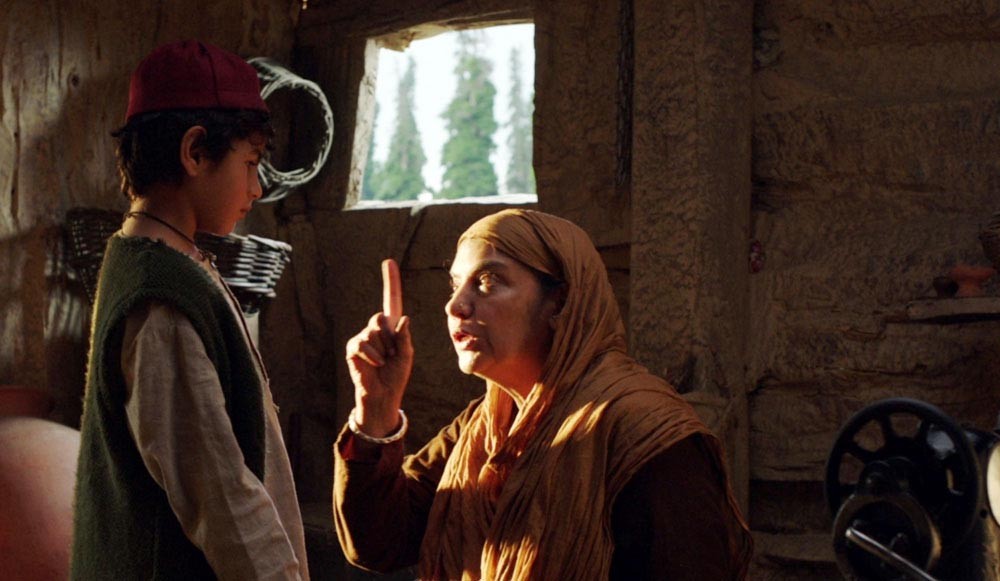
There is an ethereal charm to this new film based on Munshi Premchand’s story Eidgah, brought to the big screen through Pakistani writer Umera Ahmed’s dialogues

Based on a short story, Eidgah, by noted Hindi-Urdu writer of early 20th century Munshi Premchand, comes a heartwarming film that tells the tale of an aging grandmother, Ameena (Shabana Azmi) and her little grandson, Hamid (Youhan Panjuani).
Titled 5 Rupya, the feature-length film, expands Premchand’s classic yarn into a story of timeless values and heart. In a world obsessed with impossible superheroes and weird zombies, a very real child’s very real story that merely relies on heart and compassion is a refreshing change to witness on the big screen.
The story is set in a beautiful valley that seems to exist beyond the realms of modern-day time and culture. Young children count their ‘eidis’ for the upcoming village fair. Here the wheels are turned manually instead of by machines. Parenting is basic and rustic but rooted and tangible. Children skip through forests and fields to attend school. They rush to buy sweet-meats wrapped in newspapers instead of jellies and chocolates wrapped in plastic. They steal fruit from trees instead of wifi passwords. The temporal suspension of the story serves as an important backdrop that helps you perceive Hamid’s honesty, simplicity and his relationship with his grandmother.
The dialogues of 5 Rupya are written by the famed Pakistani playwright and novelist Umera Ahmed. There is a strong spiritual element to her writing, and some of that does indeed reflect at various points in Ameena’s dialogues. The quick repartee between the children and the snide remarks of Ameena’s fellow community members are very strong and provide a credible strength to the film, though it could have easily been much shorter.
Veteran Indian ad filmmaker Piyush Panjuani, who directs and co-writes 5 Rupya, mentioned somewhere that certain angles in the film were previously not present in Premchand’s story and are completely Ahmed’s addition.
Ameena stitches clothes, cooks, cleans, and takes care of her young grandson. Her son and daughter-in-law have passed away and she has told young Hamid that one Eid they will return to him bearing gifts. But Hamid, in one scene, sits on his father’s grave while his friends tell him there is no way out of it.
Gifted child actor Youhan Panjuani uses natural candour convincingly to make the audience feel for the little orphan. It is interesting that the director said that he had searched high and low for a child actor who could play Hamid but found the perfect actor in his nephew (Youhan). The young Panjuani shines and his tears and laughs are as substantial as his onscreen presence.
Shabana Azmi’s portrayal of Ameena is flawless. From her laboured walk to her conflicted, uneasy looks while listening to her townspeople, Azmi amplifies the conflict of the film; a conflict, though, that is slow to come to the fore.
Her strong performance makes up for the loose ends the film just doesn’t tie up and the heartwarming relationship between her and Hamid make up the most intriguing parts of the film.
5 Rupya spends much time in connecting to a mythical, sufi interpretation of Premchand’s story, as the opening credits and various points in the film see a whirling dervish, sometimes at night, sometimes appearing and disappearing through the day.
During a Q&A session at the Dubai International Film Festival 2017 where the film was screened, Azmi talked about how it was a wonderful story in the age of violence and endless bad news flooding the television screens. Panjuani talked about how he got Ahmed on board -- by telling her that this wasn’t a "typical Bollywood film," rather it is based on ideals of hope, heart, and innocence. The audience seemed to agree with him as they applauded heartily when the cast and crew of the film made their way onto the stage post-credits.
In the age of the smartphones where the children are less connected to the outside world than they are to a virtual reality, to have films like 5 Rupya receive applause and find an audience is a sign of hope indeed.